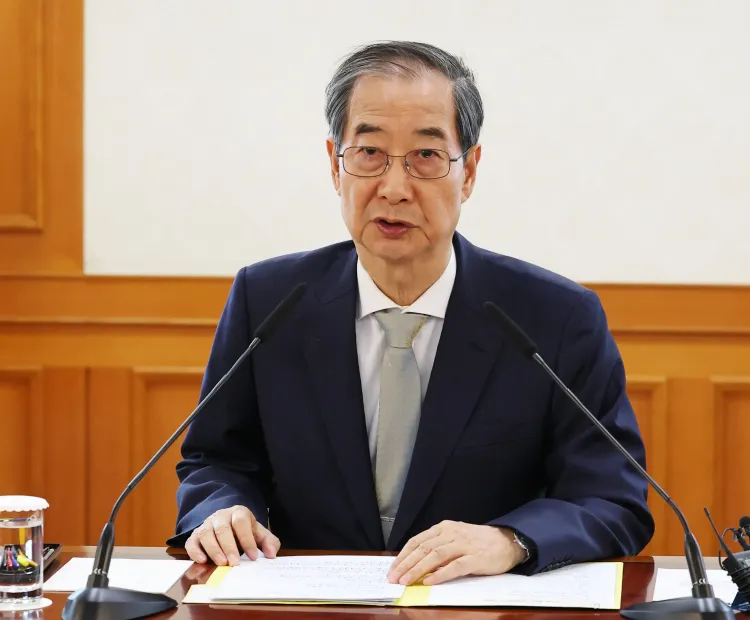South Korea's Acting President Declines Coalition with China, Japan Against Trump Tariffs

Synopsis
Key Takeaways
- South Korea will not form alliances with China and Japan against US tariffs.
- Negotiations with Washington are prioritized for resolving tariff issues.
- Han Duck-soo emphasizes a calm approach to negotiations.
- The recent tariffs may significantly impact South Korea's export-driven economy.
- Collaboration with the US is seen as essential for economic stability.
Seoul, April 9 (NationPress) South Korea's Acting President Han Duck-soo has stated that South Korea will not ally with China and Japan to counteract US tariff policies, opting instead for negotiations with Washington to address the issues at hand.
In a recent CNN interview, Han expressed his views just a day prior to the implementation of the Trump administration's 25 percent 'reciprocal tariff' on South Korea, a move that raises concerns for the nation's export-reliant economy.
Han remarked, "I don't believe that kind of retaliation will significantly enhance the situation," when questioned about potential collaboration with Japan or China against the US tariffs.
"We will not pursue that path," he affirmed.
This interview followed Han’s conversation with Trump, marking the first direct communication between the leaders since Trump took office in January. Han has stepped into the role of acting President after Yoon Suk Yeol, the South Korean President, was impeached over his brief imposition of martial law in December and subsequently removed from office last week.
As Trump has introduced duties on what his administration deems the "worst offenders," including crucial US allies, some analysts have speculated about the potential for affected nations to unite with China to counter Trump's increasing tariff measures, as reported by Yonhap news agency.
Trump's tariff initiatives have significantly impacted Asian economies, with a minimum 10 percent 'baseline' tariff and reciprocal tariffs announced last week, following the implementation of 25 percent tariffs on steel and aluminum imports as well as foreign vehicle imports. His administration is also considering tariffs on semiconductors, pharmaceuticals, and other items.
The President has utilized tariffs as a means to generate federal revenue, reduce America's trade deficits, attract foreign investments, and promote domestic manufacturing, despite worries that these tariffs might lead to heightened inflation and slower economic growth.
Condemning the tariff strategies, US Senator Brian Schatz (D-Hawaii) referred to the recent trilateral meeting of Trade Ministers from South Korea, Japan, and China, describing the image of the three as possibly the "most shocking image" suggesting global unity against America.
While referring to the newly imposed levies as "unfortunate," Han mentioned that South Korea would "negotiate calmly" with Washington to seek a resolution based on the strong alliance between the two nations, according to CNN.
Han indicated that "not everything will be resolved in a short time," but he remains hopeful for a resolution.
"We should carefully assess what this 25 percent means for us and engage in negotiations with them in a composed manner," he was quoted as saying.
Seoul has been putting forth extensive efforts to address the tariff increase, with senior trade officials visiting Washington for discussions with the Trump administration regarding the situation.
In a Facebook post on Wednesday, Han reiterated Seoul's dedication to collaborating with Washington.
"While some countries are opting for a strict response with retaliatory tariffs, I believe that during challenging times, the more prudent approach is to strengthen the South Korea-US alliance as both a security and economic partnership," he stated.
"The most effective way to resolve a problem is through calm communication with the other party while consistently seeking a solution that benefits both sides."










